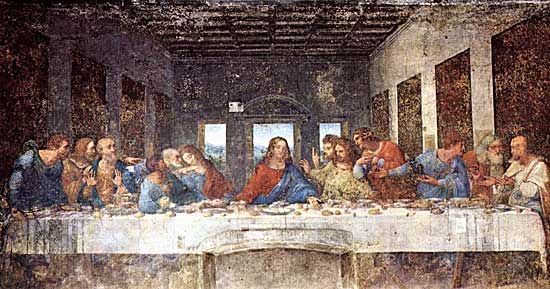 That I pick for Holy Thursday the question that Jews pose to their children at the Passover seder should require no explanation. We need not concern ourselves with whether The Last Supper was truly a Passover seder or only a chaburah meal, marking a formal gathering of spiritual friends of a kind well-known in the Judaism of Jesus' time. What makes tonight different is that the institution of the Eucharist on this night marks the Passover of the Lord and equips us for our own.
That I pick for Holy Thursday the question that Jews pose to their children at the Passover seder should require no explanation. We need not concern ourselves with whether The Last Supper was truly a Passover seder or only a chaburah meal, marking a formal gathering of spiritual friends of a kind well-known in the Judaism of Jesus' time. What makes tonight different is that the institution of the Eucharist on this night marks the Passover of the Lord and equips us for our own.That is often overlooked on a day when the focus is very often on all the controversies surrounding the ministerial priesthood and the liturgy. Too many of those about the former concern sex and gender; too many of those about the latter are matters of taste. Both tend to distract in the wrong hands, i.e., the usual hands. The real significance of tonight is that the Old Covenant is fulfilled in the New with the manna that is the Eucharist. That food is God himself in the flesh, given so that we might each be nourished on our exodus from slavery to sin into the glorious freedom of being his children.
The Gospel reading tonight was John 13: 1-15. Lay people sometimes wonder why St. John, unlike the Synoptics and even St. Paul (1 Corinthians 11: 23-26), does not mention the actual institution of the Eucharist, and presents instead Jesus' washing of the Apostles' feet and a long "priestly prayer" that almost certainly is a literary interpretation of what was actually said. Scholars who lack faith sometimes argue that this shows how John's community thought the main tradition needed correction. But there is neither a mystery nor a problem with such a substitution. John is presupposing the standard account of the Eucharist's institution and is, rather, offering a more mature theology of it for the instruction of the Church.
It's amazing that, for the most part, Christians still don't take in such instruction. In the way members of the Church interact with each other as such, I rarely see the humility and sacrificial love Jesus modelled on that night. Those virtues are often shown within families and between friends, but not to people merely because they are brothers and sisters in the Lord. That lack must be filled if the Church is to survive as an intentional community. To that end, let us hearken to Jesus' "priestly prayer" (John 17) and become what we receive at the Eucharist.





























